Pokémon the Series: Difference between revisions
m (→Overview) |
|||
| Line 7: | Line 7: | ||
==Overview== | ==Overview== | ||
From the [[EP001| | From the [[EP001|first episode]], Ash has been the central character, making his goal of becoming a Pokémon Master known to all he meets. Though initially, he only became a Pokémon Trainer with the goal of beating his rival, [[Gary Oak]], the many Pokémon Ash has met over his {{pkmn|journey}} have shown him what being a Pokémon Master really is. Unlike most Trainers from Pallet, and indeed, unlike players of {{game2|Red|Green|Blue}} and {{game|FireRed and LeafGreen|s}}, Ash did not start his journey with {{p|Bulbasaur}}, {{p|Charmander}}, or {{p|Squirtle}}, as he arrived late to {{an|Professor Oak}}'s [[Professor Oak's Laboratory|lab]] to receive his [[starter Pokémon]]. Instead, Ash was given the only Pokémon Oak had left to give, a {{AP|Pikachu}} that did not enjoy being inside his {{i|Poké Ball}}, and from there Ash learned to treat his Pokémon as partners, earning Pikachu's trust by keeping him safe from a flock of {{p|Spearow}} he angered. | ||
Since then, Ash has journeyed across all seven of the regions that appear in the [[core series]] [[Pokémon games]], as well as the [[Orange Archipelago]], a region he visited before beginning his journey in [[Johto]] until it was closer in time to the real-world release of {{game|Gold and Silver|s}}. In the regions outside of [[Galar]], he battles against the local [[Gym Leader]]s for their [[Badge]]s, as do Trainers in the core series games, to compete in the regional [[Pokémon League]], a [[Pokémon League Conference|championship tournament]], rather than five battles straight against the [[Elite Four]] and {{pkmn|Champion}}. While his initial strategy was to continue using the same party over the course of his {{pkmn|journey}}, letting some Pokémon go when they were required to do something or wanted to train, he has, since his journey in Hoenn, changed strategy, and now uses only those Pokémon which he has caught in the region, alongside Pikachu, to battle against Gym Leaders, with his explanation to Dawn being that he wants to prove to the young, unevolved Pokémon he meets in each new region that ''they'' can win if they try. | Since then, Ash has journeyed across all seven of the regions that appear in the [[core series]] [[Pokémon games]], as well as the [[Orange Archipelago]], a region he visited before beginning his journey in [[Johto]] until it was closer in time to the real-world release of {{game|Gold and Silver|s}}. In the regions outside of [[Galar]], he battles against the local [[Gym Leader]]s for their [[Badge]]s, as do Trainers in the core series games, to compete in the regional [[Pokémon League]], a [[Pokémon League Conference|championship tournament]], rather than five battles straight against the [[Elite Four]] and {{pkmn|Champion}}. While his initial strategy was to continue using the same party over the course of his {{pkmn|journey}}, letting some Pokémon go when they were required to do something or wanted to train, he has, since his journey in Hoenn, changed strategy, and now uses only those Pokémon which he has caught in the region, alongside Pikachu, to battle against Gym Leaders, with his explanation to Dawn being that he wants to prove to the young, unevolved Pokémon he meets in each new region that ''they'' can win if they try. | ||
Revision as of 00:03, 22 June 2020

The Pokémon anime, often referred to as just "the anime" by Pokémon fans, is a collective term referring to currently 1,264 main series episodes, 23 movies, and a number of side stories, all focusing on Pokémon. The great majority of these focus on Ash Ketchum, a Pokémon Trainer from Pallet Town, and his journey toward his ultimate goal of being a Pokémon Master, his many friends, and most especially his Pokémon, whom he considers his partners and friends.
Though the anime is ultimately based upon the games and draws heavily from them, many concepts which are only touched on the games are spun in a unique way, and expanded on.
The anime has aired in 169[1] different countries and regions in over 30 languages. It is available on Netflix in 217 countries with different dubs and subtitles, and all countries except Japan and South Korea have at least English audio.[2] The Pokémon Company International usually refers to the anime as the "Pokémon animated series" or "Pokémon television series", while some event Pokémon based on Pokémon from the anime have their location set as "the Pokémon cartoon" in the English version of the games. It is also referred to formally as Pokémon the Series (Japanese: テレビアニメ「ポケットモンスター」シリーズ TV Anime "Pocket Monsters" Series).
Overview
From the first episode, Ash has been the central character, making his goal of becoming a Pokémon Master known to all he meets. Though initially, he only became a Pokémon Trainer with the goal of beating his rival, Gary Oak, the many Pokémon Ash has met over his journey have shown him what being a Pokémon Master really is. Unlike most Trainers from Pallet, and indeed, unlike players of Pokémon Red, Green, and Blue and Pokémon FireRed and LeafGreen, Ash did not start his journey with Bulbasaur, Charmander, or Squirtle, as he arrived late to Professor Oak's lab to receive his starter Pokémon. Instead, Ash was given the only Pokémon Oak had left to give, a Pikachu that did not enjoy being inside his Poké Ball, and from there Ash learned to treat his Pokémon as partners, earning Pikachu's trust by keeping him safe from a flock of Spearow he angered.
Since then, Ash has journeyed across all seven of the regions that appear in the core series Pokémon games, as well as the Orange Archipelago, a region he visited before beginning his journey in Johto until it was closer in time to the real-world release of Pokémon Gold and Silver. In the regions outside of Galar, he battles against the local Gym Leaders for their Badges, as do Trainers in the core series games, to compete in the regional Pokémon League, a championship tournament, rather than five battles straight against the Elite Four and Champion. While his initial strategy was to continue using the same party over the course of his journey, letting some Pokémon go when they were required to do something or wanted to train, he has, since his journey in Hoenn, changed strategy, and now uses only those Pokémon which he has caught in the region, alongside Pikachu, to battle against Gym Leaders, with his explanation to Dawn being that he wants to prove to the young, unevolved Pokémon he meets in each new region that they can win if they try.
Over the course of the series, Ash has had several friends who travel with him, typically across one region, who assist him in his journey as much as he assists in theirs. Misty, the Gym Leader from Cerulean City in the games, joins him in the original series, as does Brock, Pewter City's Gym Leader, in Kanto, Johto, Hoenn, and Sinnoh. Tracey Sketchit, an amateur Pokémon watcher, joins Ash during his Orange Archipelago journey, but leaves him on Ash's return to Pallet to become an assistant to Professor Oak, his hero. May and Dawn, rookie Coordinators, join Ash for the duration of Pokémon the Series: Ruby and Sapphire and Pokémon the Series: Diamond and Pearl, respectively; in these he mentors them much as Brock and Misty did him, while Max, May's brother, who is too young to own Pokémon, looks up to Ash for the duration of Pokémon the Series: Ruby and Sapphire. Iris and Cilan travel with Ash in Pokémon the Series: Black & White. Inventor Clemont, his sister Bonnie, and Ash's childhood friend Serena travel with Ash in Pokémon the Series: XY. Like Max, Bonnie is too young to own Pokémon, but cares for her brother's Dedenne. In Pokémon the Series: Sun & Moon, Ash attends the Pokémon School instead of traveling around the Alola region. As such, his new friends—Lillie, Mallow, Kiawe, Lana, and Sophocles—are not traveling companions but classmates. In Pokémon Journeys: The Series, Ash's sole new traveling companion is Goh, a Trainer who aims to catch every Pokémon species in the world, with his ultimate goal being to catch the Mythical Pokémon Mew.
The anime is produced in Japan by OLM in association with ShoPro and JR Kikaku and airs on TV Tokyo nearly every week, with the exception of a four-month hiatus after the Porygon incident and a seven-week hiatus during the COVID-19 pandemic. Until the Porygon incident, the show aired every Tuesday at 7 PM. The show returned afterwards at the same time on Thursdays. From April 7, 2016, to September 13, 2018, it instead began five minutes earlier at 6:55 PM on Thursdays. Since October 7, 2018, the show airs each Sunday at 6 PM. Many fans consider the dialogue and events mentioned in the Japanese version to be the "true canon", while the various dubs are regarded to be overridden if something stated in them differs from something said in a Japanese episode.
In Japan, the anime is divided into seven series: Pocket Monsters, Pocket Monsters Advanced Generation, Pocket Monsters Diamond & Pearl, Pocket Monsters Best Wishes, Pocket Monsters XY, Pocket Monsters Sun & Moon, and Pocket Monsters. Outside of it, it has been divided into eight series: Pokémon the Series: The Beginning, Pokémon the Series: Gold & Silver, Pokémon the Series: Ruby and Sapphire, Pokémon the Series: Diamond and Pearl, Pokémon the Series: Black & White, Pokémon the Series: XY, Pokémon the Series: Sun and Moon, and Pokémon Journeys: The Series. The episodes are also further divided into seasons spanning roughly 52 episodes, and currently numbering -1. This concept of a television season was first embraced by the Japanese source with the inclusion of an explicitly second season to Best Wishes.
The show is mainly aimed at children, and as such, mature topics such as death are not often brought up, though sometimes they appear in some episodes, and most notably in movies. Many Pokémon that are implied to be violent or sinister in the games are also made to be less aggressive. There are generally some references meant for adults, though these are kept to a minimum especially outside of Japan.
Television series
Original series
| Japan | United States | |||||
|---|---|---|---|---|---|---|
| Season | Theme song | First episode | Season | Theme song | First episode | |
 Pocket Monsters |
 Aim to Be a Pokémon Master |
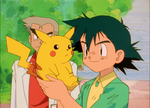 EP001 |
 Indigo League |
 Pokémon Theme |
 EP001 | |
 Pocket Monsters: Episode Orange Archipelago |
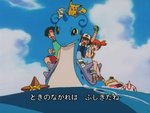 The Rivals |
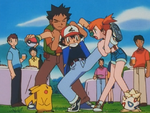 EP081 |
 Adventures in the Orange Islands |
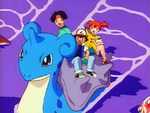 Pokémon World |
 EP081 | |
 Pocket Monsters: Episode Gold & Silver |
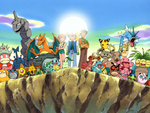 OK! |
 EP117 |
 The Johto Journeys |
 Pokémon Johto |
 EP117 | |
 Aim to Be a Pokémon Master |
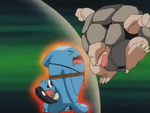 EP192 |
 Johto League Champions |
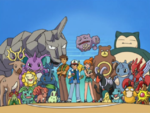 Born to Be a Winner |
 EP158 | ||
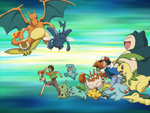 Ready Go! |
 EP239 |
 Master Quest |
 Believe in Me |
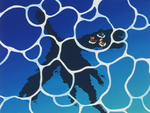 EP210 | ||
Pokémon the Series: Ruby and Sapphire
| Japan | United States | |||||
|---|---|---|---|---|---|---|
| Season | Theme song | First episode | Season | Theme song | First episode | |
 Pocket Monsters Advanced Generation |
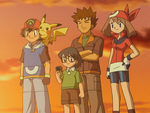 Advance Adventure |
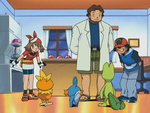 AG001 |
 Advanced |
 I Wanna Be a Hero |
 AG001 | |
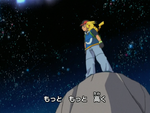 Challenger!! |
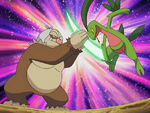 AG070 |
 Advanced Challenge |
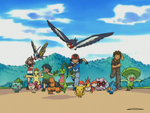 This Dream |
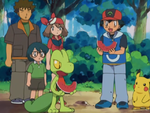 AG041 | ||
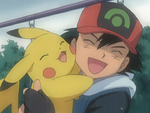 Pokémon Symphonic Medley |
 AG105 |
 Advanced Battle |
 Unbeatable |
 AG093 | ||
 Battle Frontier |
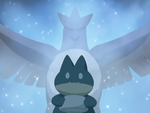 AG135 | |||||
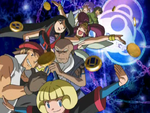 Spurt! |
 AG166 |
 Battle Frontier |
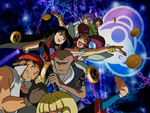 Battle Frontier |
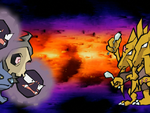 AG146 | ||
Pokémon the Series: Diamond and Pearl
| Japan | United States | |||||
|---|---|---|---|---|---|---|
| Season | Theme song | First episode | Season | Theme song | First episode | |
 Pocket Monsters Diamond & Pearl |
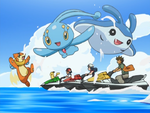 Together |
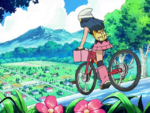 DP001 |
 Diamond and Pearl |
 Diamond and Pearl |
 DP001 | |
 Battle Dimension |
 We Will Be Heroes |
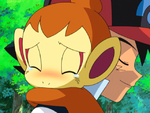 DP053 | ||||
 High Touch! |
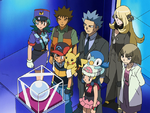 DP096 |
 Galactic Battles |
 Battle Cry - (Stand Up!) |
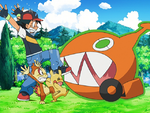 DP105 | ||
 The Greatest - Everyday! |
 DP158 |
 Sinnoh League Victors |
 We Will Carry On! |
 DP158 | ||
Pokémon the Series: Black & White
| Japan | United States | |||||
|---|---|---|---|---|---|---|
| Season | Theme song | First episode | Season | Theme song | First episode | |
 Pocket Monsters Best Wishes! |
 Best Wishes! |
 BW001 |
 Black & White |
 Black and White |
 BW001 | |
 Pocket Monsters Best Wishes! Season 2 |
 Be an Arrow! |
 BW085 |
 Rival Destinies |
 Rival Destinies |
 BW049 | |
 Pocket Monsters Best Wishes! Season 2: Episode N |
 Be an Arrow! 2013 |
 BW109 |
 Adventures in Unova |
 It's Always You and Me |
 BW098 | |
 Pocket Monsters Best Wishes! Season 2: Decolora Adventure |
 Summerly Slope |
 BW123 |
 Adventures in Unova and Beyond |
 BW123 | ||
Pokémon the Series: XY
| Japan | United States | |||||
|---|---|---|---|---|---|---|
| Season | Theme song | First episode | Season | Theme song | First episode | |
 Pocket Monsters XY |
 V (Volt) |
 XY001 |
 Pokémon the Series: XY |
 Pokémon Theme |
 XY001 | |
 Mega V (Mega Volt) |
 XY029 | |||||
 Mad-Paced Getter |
 XY055 |
 Pokémon the Series: XY Kalos Quest |
 Be a Hero |
 XY050 | ||
 Pocket Monsters XY&Z |
 XY&Z |
 XY094 |
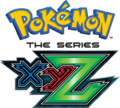 Pokémon the Series: XYZ |
 Stand Tall |
 XY094 | |
Pokémon the Series: Sun & Moon
| Japan | United States | |||||
|---|---|---|---|---|---|---|
| Season | Theme song | First episode | Season | Theme song | First episode | |
 Pocket Monsters Sun & Moon |
 Alola!! |
 SM001 |
 Pokémon the Series: Sun & Moon |
 Under The Alolan Sun |
 SM001 | |
 Aim to Be a Pokémon Master |
 SM030 | |||||
 Future Connection |
 SM061 |
 Pokémon the Series: Sun & Moon—Ultra Adventures |
 Under The Alolan Moon |
 SM044 | ||
 Your Adventure |
 SM091 |
 Pokémon the Series: Sun & Moon—Ultra Legends |
 The Challenge of Life |
 SM093 | ||
Pokémon Journeys: The Series
| Japan | United States | |||||
|---|---|---|---|---|---|---|
| Season | Theme song | First episode | Season | Theme song | First episode | |
 Pocket Monsters |
 One, Two, Three |
 JN001 |
 Pokémon Journeys: The Series |
 The Journey Starts Today |
 JN001 | |
Side stories
| Japanese name | Japanese run | English name | English run |
|---|---|---|---|
 Pocket Monsters Side Stories |
December 3, 2002 — September 28, 2004 |  Pokémon Chronicles |
June 3, 2006 — September 30, 2006 |
Movies
- Main article: Pokémon movie
Since 1998 in Japan, and since 1999 in the US, a Pokémon movie has been released annually, most often focusing on a Legendary or Mythical Pokémon. These films are almost always a large success in Japan, and remain at least somewhat successful in the United States and other countries, having been aired on television as a special since the ninth movie, with the first five movies receiving wide releases and later films occasionally receiving limited releases.
The movies are not considered by all people to be canon to the show, with some preferring to think of them occurring in an alternate timeline. This theory comes from the fact that Ash and his friends do not seem to be profoundly affected in the show by the events of the movies, which tend to have a lot of peril and drama. Others, however, see the movies as being akin to filler episodes, as none of their parties change, and no Gym Leaders are defeated nor Pokémon Contests won. This is presumably the correct interpretation, as not only have most of the events of the movies been referenced at least peripherally in the show, but also, several of the events of even major episodes have been forgotten by the writers of later episodes.
Original series
| Japan | Pikachu Project | US | ||
|---|---|---|---|---|
| Japanese title | Release date | English title | Release date | |
 ミュウツーの逆襲 Mewtwo's Counterattack |
July 18, 1998 |  Pikachu Project 1998 |
 Mewtwo Strikes Back |
November 12, 1999 |
 幻のポケモン ルギア爆誕 Phantom Pokémon: Lugia's Explosive Birth |
July 17, 1999 |  Pikachu Project 1999 |
 The Power of One |
July 21, 2000 |
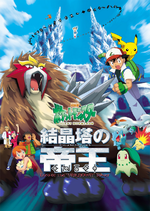 結晶塔の帝王爆誕 Emperor of the Crystal Tower: Entei |
July 8, 2000 |  Pikachu Project 2000 |
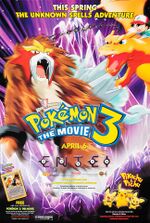 Spell of the Unown: Entei |
April 6, 2001 |
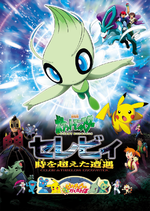 セレビィ時を超えた遭遇 Celebi: An Encounter Through Time |
July 7, 2001 |  Pikachu Project 2001 |
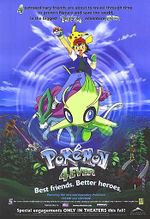 Celebi: The Voice of the Forest |
October 11, 2002 |
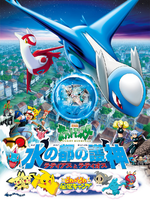 水の都の護神 ラティアスとラティオス Guardian Gods of the City of Water: Latias and Latios |
July 13, 2002 |  Pikachu Project 2002 |
 Pokémon Heroes: Latios & Latias |
May 16, 2003 |
Pokémon the Series: Ruby and Sapphire
| Japan | Pikachu Project | US | ||
|---|---|---|---|---|
| Japanese title | Release date | English title | Release date | |
 七夜の願い星 ジラーチ Wishing Star of the Seven Nights: Jirachi |
July 19, 2003 |  Pikachu Project 2003 |
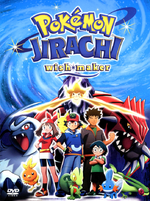 Jirachi: Wish Maker |
June 1, 2004 |
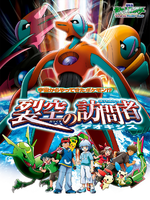 裂空の訪問者 デオキシス Sky-Splitting Visitor: Deoxys |
July 17, 2004 |  Pikachu Project 2004 |
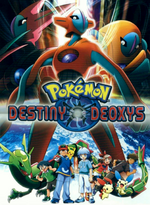 Destiny Deoxys |
January 22, 2005 |
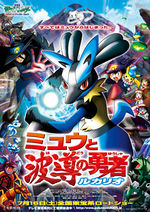 ミュウと波導の勇者 ルカリオ Mew and the Wave-Guiding Hero: Lucario |
July 16, 2005 |  Pikachu Project 2005 |
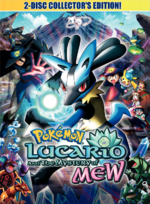 Lucario and the Mystery of Mew |
September 19, 2006 |
 ポケモンレンジャーと蒼海の王子 マナフィ Pokémon Ranger and the Prince of the Sea: Manaphy |
July 15, 2006 |  Pikachu Project 2006 |
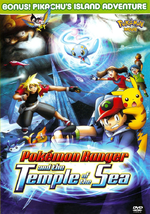 Pokémon Ranger and the Temple of the Sea |
March 23, 2007 |
Pokémon the Series: Diamond and Pearl
| Japan | Pikachu Project | US | ||
|---|---|---|---|---|
| Japanese title | Release date | English title | Release date | |
 ディアルガVSパルキアVSダークライ Dialga VS Palkia VS Darkrai |
July 14, 2007 |  Pikachu Project 2007 |
 The Rise of Darkrai |
February 24, 2008 |
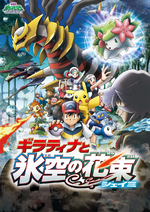 ギラティナと氷空の花束 シェイミ Giratina and the Sky's Bouquet: Shaymin |
July 19, 2008 |  Pikachu Project 2008 |
 Giratina and the Sky Warrior |
March 31, 2009 |
 アルセウス 超克の時空へ Arceus: To a Conquering Spacetime |
July 18, 2009 |  Pikachu Project 2009 |

|
November 20, 2009 |
 幻影の覇者ゾロアーク Ruler of Illusions: Zoroark |
July 10, 2010 |  Pikachu Project 2010 |
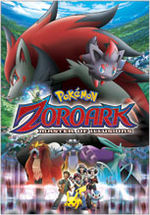 Zoroark: Master of Illusions |
February 5, 2011 |
Pokémon the Series: Black & White
| Japan | Pikachu Project | US | ||
|---|---|---|---|---|
| Japanese title | Release date | English title | Release date | |
 ビクティニと黒き英雄ゼクロム Victini and the Black Hero: Zekrom |
July 16, 2011 |  Pikachu Project 2011 |

|
December 3, 2011 |
 ビクティニと白き英雄レシラム Victini and the White Hero: Reshiram |

|
December 10, 2011 | ||
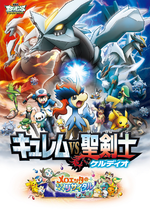 キュレムVS聖剣士ケルディオ Kyurem VS the Sacred Swordsman: Keldeo |
July 14, 2012 |  Pikachu Project 2012 |
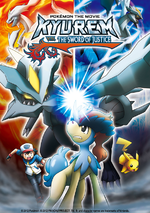
|
December 8, 2012 |
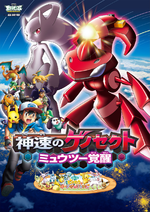 神速のゲノセクト ミュウツー覚醒 Extreme Speed Genesect: Mewtwo Awakens |
July 13, 2013 |  Pikachu Project 2013 |
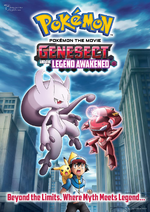
|
October 19, 2013 |
Pokémon the Series: XY
| Japan | Pikachu Project | US | ||
|---|---|---|---|---|
| Japanese title | Release date | English title | Release date | |
 破壊の繭とディアンシー The Cocoon of Destruction and Diancie |
July 19, 2014 |  Pikachu Project 2014 |
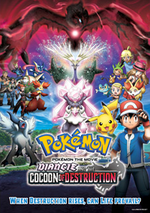 Diancie and the Cocoon of Destruction |
November 8, 2014 |
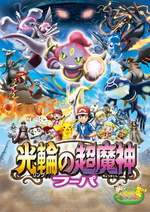 光輪の超魔神 フーパ The Archdjinni of the Rings: Hoopa |
July 18, 2015 |  Pikachu Project 2015 |
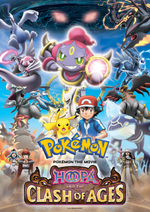 Hoopa and the Clash of Ages |
December 19, 2015 |
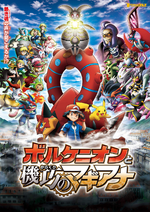 ボルケニオンと機巧のマギアナ Volcanion and the Mechanical Magearna |
July 16, 2016 |  Pikachu Project 2016 |
 Volcanion and the Mechanical Marvel |
December 5, 2016 |
Pokémon the Series: Sun & Moon
| Japan | Pikachu Project | US | ||
|---|---|---|---|---|
| Japanese title | Release date | English title | Release date | |
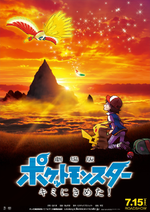 キミにきめた! I Choose You! |
July 15, 2017 | Pikachu Project 2017 | 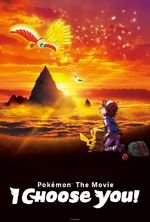 I Choose You! |
November 5, 2017 |
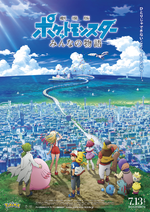 みんなの物語 Everyone's Story |
July 13, 2018 | Pikachu Project 2018 | 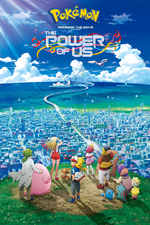 The Power of Us |
November 24, 2018 |
 ミュウツーの逆襲 EVOLUTION Mewtwo's Counterattack Evolution |
July 12, 2019 | Pikachu Project 2019 |  Mewtwo Strikes Back—Evolution |
February 27, 2020 |
Pokémon Journeys: The Series
| Japan | Pikachu Project | US | ||
|---|---|---|---|---|
| Japanese title | Release date | English title | Release date | |
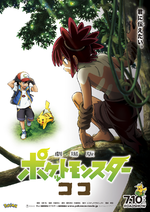 ココ Koko |
TBA | Pikachu Project 2020 | TBA | TBA |
Other anime series
As the franchise progressed, other animated features, set outside the main series' canon, have been produced. These are often made to promote a new generation or game.
Miniseries
| Feature | Japanese run | English run |
|---|---|---|
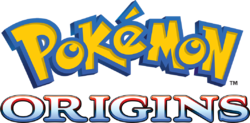 Pokémon Origins |
October 2, 2013 | November 15 - 22, 2013 |
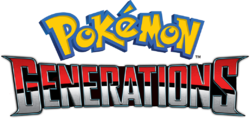 Pokémon Generations |
December 9, 2016 - February 2, 2017 | September 16 - December 23, 2016 |
 Pokémon: Twilight Wings |
January 15, 2020 - Summer 2020 | January 15, 2020 - Summer 2020 |
Mystery Dungeon episodes
| Feature | Japanese debut | English debut |
|---|---|---|
 Pokémon Mystery Dungeon: Team Go-Getters Out of the Gate! |
March 23, 2007 | September 8, 2006 |
 Pokémon Mystery Dungeon: Explorers of Time & Darkness |
September 9, 2007 | September 1, 2008 |
 Pokémon Mystery Dungeon: Explorers of Sky - Beyond Time & Darkness |
April 12, 2009 | October 9, 2009 |
Animated trailers
| Feature | Japanese debut | English debut |
|---|---|---|
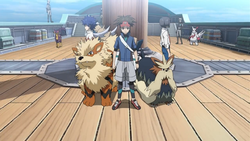 Pokémon Black Version 2 and Pokémon White Version 2 Animated Trailer |
May 17, 2012 | August 8, 2012 |
 Pokémon Mystery Dungeon Animated Shorts |
November 1, 2012 | March 26, 2013 |
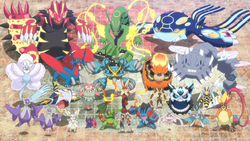 Pokémon Omega Ruby and Pokémon Alpha Sapphire Animated Trailer |
November 16, 2014 | November 20, 2014 |
 Pokémon Masters Animated Trailer |
June 27, 2019 | June 27, 2019 |
Variety shows
These are Pokémon variety shows that air on Japanese television.
| Japanese name | Run |
|---|---|
 ポケットモンスター アンコール Pocket Monsters Encore |
October 19, 1999 — September 17, 2002 |
 週刊ポケモン放送局 Weekly Pokémon Broadcasting Station |
October 15, 2002 — September 28, 2004 |
 ポケモン☆サンデー Pokémon Sunday |
October 3, 2004 — September 26, 2010 |
ポケモンスマッシュ! Pokémon Smash! |
October 3, 2010 — September 29, 2013 |
ポケモンゲット☆TV Pokémon Get☆TV |
October 6, 2013 — September 27, 2015 |
 ポケモンの家あつまる? Meet Up at the Pokémon House? |
October 4, 2015 — present |
Trivia

- Animator Masāki Iwane 岩根正明 once stated that the series was originally slated for a 1½-year run, which corresponds approximately to the length of the Kanto region saga (had it not been delayed due to the Porygon incident). Due to its popularity during the run, however, the show was extended and continues to be one of the longest running video game-based anime series.
- During the early episodes of the original series, Japanese text was seen quite frequently on signs and buildings as well as objects. This usually resulted in the English dubbed version (and thus, foreign dubs based on it) painting out the text or converting it to English.
- During the Johto saga, the animators acknowledged the practice of painting out the Japanese text in the English dub. As a result, they used made-up symbols slightly similar to the Latin script instead of Japanese text, so it would be universal to all languages and would not have to be edited for the English localization.
- During Pokémon the Series: Ruby and Sapphire and Pokémon the Series: Diamond and Pearl, the animators used a new style of symbols that appear to be blocky letters without a resemblance to any alphabet. However, most of these were still edited out for the English dub until Pokémon: Battle Frontier.
- From Pokémon the Series: Black & White and onward, a full writing system was specifically created for the anime. This language consists of three different fonts: a font used for titles, big signboards, etc.; other font used as less remarkable text accompanying the title font; and other font used only occasionally as a minor text filler. Each font has 26 unique symbols, and each one of those symbols represents a letter from the modern Latin script.
- This text usually has meanings, as the symbols converted from the Latin script are written as romanized Japanese; sometimes its meanings are related to the context in which it is used, but sometimes the text contains hidden messages, like mentioning Wobbuffet in a magazine seen in BW001.
- This writing system would start being used occasionally in the games as part of the scenario, starting from Pokémon Sun and Moon.
- Fingernails are not consistently drawn on characters, with the exception of Pokémon the Series: XY. Some characters have fingernails in Pokémon the Series: Sun & Moon.
In other languages
| ||||||||||||||||||
Related articles
References
- ↑ Pokémon in Figures - The Pokémon Company (retrieved June 2, 2020)
- ↑ Pokémon the Series - Unofficial Netflix Online Global Search (retrieved June 2, 2020)
External links
- Pokémon TV Tokyo website (Japanese)
- Official Pokémon website (Japanese)
- Official Pokémon website (English)
On Bulbagarden forums

|
This article is part of Project Anime, a Bulbapedia project that covers all aspects of Pokémon animation. |